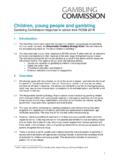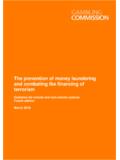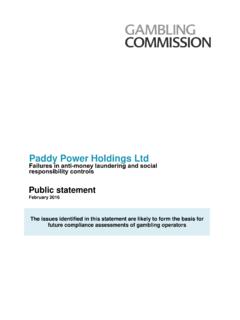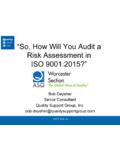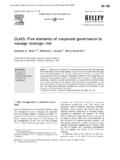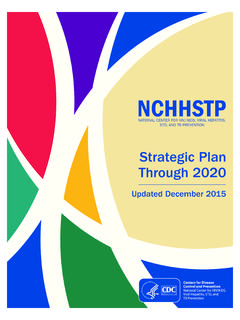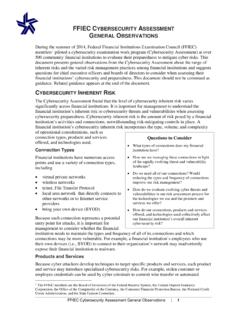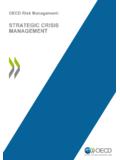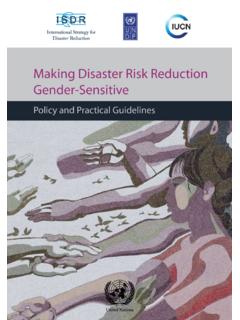Transcription of Money laundering and terrorist financing risk …
1 Money laundering and terrorist financing risk within the British gambling industry Risk assessment November 2017 2 Contents 1 Executive summary 3 2 Introduction 4 3 Regulatory framework 4 4 Money laundering and terrorist financing threat 5 5 Industry overview 7 6 Arcades 8 7 Betting (non-remote) 13 8 Bingo (non-remote) 21 9 Casino (non-remote) 27 10 Gaming machine technical and gambling software 38 11 Lotteries 44 12 Remote (casino) 48 13 Remote (betting and bingo) 56 14 Methodology 64 3 1 Executive summary The Gambling Commission s Money laundering and terrorist financing risk assessment 2017 highlights the core risks associated with each of the sectors within Great Britain s (GB) licensed gambling industry.
2 The purpose of this risk assessment is to: act as a resource for the industry in informing their own Money laundering and terrorist financing (ML/TF) risk assessments meet our statutory anti- Money laundering supervisor responsibilities advise HM Government on risks in the industry; and inform and prioritise our compliance activity to raise standards in the industry. This assessment has been developed in consultation with sector and industry specialists. The Commission has liaised with law enforcement, including the national Crime Agency (NCA), and considered approaches taken by other AML supervisory authorities, such as the Financial Conduct Authority (FCA). The Commission also considers HM Treasury s national Risk assessment (NRA) of Money laundering and terrorist financing 2017 when assessing the key threats posed by the risks identified in the GB gambling industry.
3 In summary, the risk ratings for each gambling sector are as follows. Note that the overall risk ratings have not changed since the previous risk assessment , published in March 2017: The gambling industry is not immune to ML/TF. It is highly segmented, with a wide range of operators based both domestically and overseas, offering diverse products, in different environments, to different types of customers, with various payment methods. Criminals are increasingly looking for alternative ways to launder criminal proceeds and the gambling industry needs to be alert to this. This assessment is a key tool in ensuring that the Commission is focussing its resource and expertise on the highest risk areas of ML/TF in the GB gambling market. We expect all operators to have an awareness of the vulnerabilities, controls and consequences associated with the ML/TF risks in gambling.
4 This document is intended to act as a valuable resource for the industry in informing their own ML/TF risk assessments. It is imperative that gambling operators comply with the requirements of the Gambling Act 2005 (the Act) and the Licence Conditions and Codes of Practice (LCCP) to ensure that they have effective policies, procedures and controls in place to prevent ML/TF, and continue to raise standards in that regard. Arcades (non-remote) Betting (non-remote) Bingo (non-remote) Casinos (non-remote) Gaming machines (remote and non-remote) Lotteries (remote and non-remote) Remote (casinos, betting and bingo) Medium Higher Medium Higher Lower Lower Higher 4 2 Introduction A risk assessment is widely seen as the foundation of any system to manage and prevent ML/TF. By knowing and understanding the risks to which the gambling industry is exposed, HM Government, law enforcement, the Commission and operators can work together to ensure that gambling in GB is a hostile place for Money launderers and terrorist financers seeking to exploit it.
5 In March 2017, we published our previous Money laundering and terrorist financing Risk assessment . This identified a number of Money laundering vulnerabilities and drew on a wide range of information sources to develop a clear evidence-based understanding. This edition of the risk assessment builds on the previous one and seeks to again highlight key areas of risk within the GB gambling industry by sector. In transposing the EU 4th Money laundering Directive (the Directive), HM Government decided to utilise powers provided to member states to exempt gambling sectors which are lower risk in comparison to the wider financial system, for example retail banking, with the exception of non-remote and remote casinos, which could not be exempted. Regulation 17 of the Money laundering , terrorist financing and Transfer of Funds (Information on the Payer) Regulations 2017 (the Regulations) places an obligation on supervisory authorities to carry out a risk assessment of their supervised sector.
6 The Commission is the supervisory authority for casinos and this obligation is met by this risk assessment . The Commission will also continue to use this risk assessment to inform HM Government of the level of risk within the entire gambling industry in GB. The Government recognises that the risk levels attributed to a particular gambling sector are not static and will vary over time. As a result, where a gambling sector can no longer be deemed low risk (including where the sector fails to effectively manage the ML/TF risks ), then it will likely lead to their inclusion within the provisions of the Regulations, subjecting that sector to its requirements. 3 Regulatory framework The Act places a responsibility on all gambling operators to prevent gambling from being a source of, being associated with crime or disorder, or being used to support crime1. The national Lottery Act requires that that the national Lottery is run and every lottery that forms part of it, is promoted with all due propriety, and that the interests of every participant in a lottery that forms part of the national Lottery are protected.
7 ML/TF are criminal activities in GB. The Proceeds of Crime Act 2002 (POCA) places a further obligation on gambling operators to be alert to attempts by customers to gamble with or launder Money acquired unlawfully and to report such activity to the appropriate authorities. This applies to all forms of Money laundering including, for example, washing criminal Money , attempting to disguise the criminal source of the funds, or simply using criminal proceeds to fund gambling. The Terrorism Act 2000 (TACT) establishes several offences concerned with engaging in or facilitating terrorism, as well as raising or possessing funds for terrorist purposes. It applies to all persons, including gambling operators and their staff, and includes specific obligations to report suspected terrorist financing . 1 Section 1(a) of the Act.
8 5 The Commission has based its framework for this and the previous assessment on FATF s risk assessment methodology. For the next iteration of the assessment , the Commission will continue to use FATF s framework and also develop bespoke methodologies specific to gambling, to provide additional information on sector specific risks and threats to operators, consumers and Government. The Regulations came into effect on 26 June 2017. These replaced the Money laundering Regulations 2007. The Regulations require remote and non-remote casinos to, for example, undertake ML/TF risk assessments, conduct due diligence checks, establish policies, procedures and controls, and provide employee training to mitigate the risks of ML/TF. The Regulations designate the Commission as the supervisory authority for casinos in GB. While, under the Regulations, HM Revenue and Customs (HMRC) is the supervisory authority for Money Service Businesses (MSB) activities, the Commission and HMRC have agreed, under regulation 7(2) of the Regulations, which the Commission acts as the supervisory authority for MSB activities carried on by casinos.
9 The risk of crime, however, affects all gambling operators, including those in the non-regulated sector, and they are required to have regard to POCA and TACT, and adopt a risk-based approach consistent with the Commission s Licence Conditions and Codes of Practice (LCCP), guidance and advice. Licence condition requires all operating licensees (with the exception of gaming machines technical and gambling software licensees) to conduct an assessment of the risks of their businesses being used for ML/TF. Licensees must also ensure they have appropriate policies, procedures and controls to prevent ML/TF having regard for their risk assessment . They must ensure that such policies, procedures and controls are implemented effectively, kept under review, revised appropriately to ensure that they remain effective, and take into account any applicable learning or guidelines published by the Commission from time to time.
10 4 Money laundering and terrorist financing threat The ML/TF threats that the gambling industry face are varied, complex and evolving rapidly. ML/TF threatens the UK s national security, economic prosperity and international standing. If left unimpeded, it damages communities and undermines the integrity of both public and private sector organisations. On an international level, ML/TF threatens security and stability, as well as harming the UK s ability to conduct business around the world. The best available estimate of the amount of Money laundering globally is equivalent to of global GDP or US$ trillion (in 2009).2 The national Crime Agency (the NCA) says, in their 2017 national Strategic assessment , that previous domestic estimates of GBP of 36 billion to GBP 90 billion for all Money laundering impacting on the UK are a significant underestimate . The Home Office has estimated the domestic social and economic cost of organised crime in the UK to be at least 24 billion per It is clear from these estimates that the risk of ML/TF to the UK economy, GB gambling market and UK consumers are significant.
